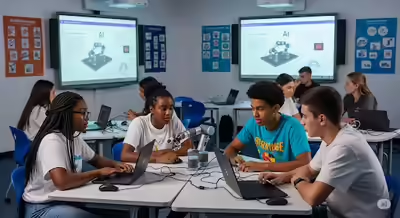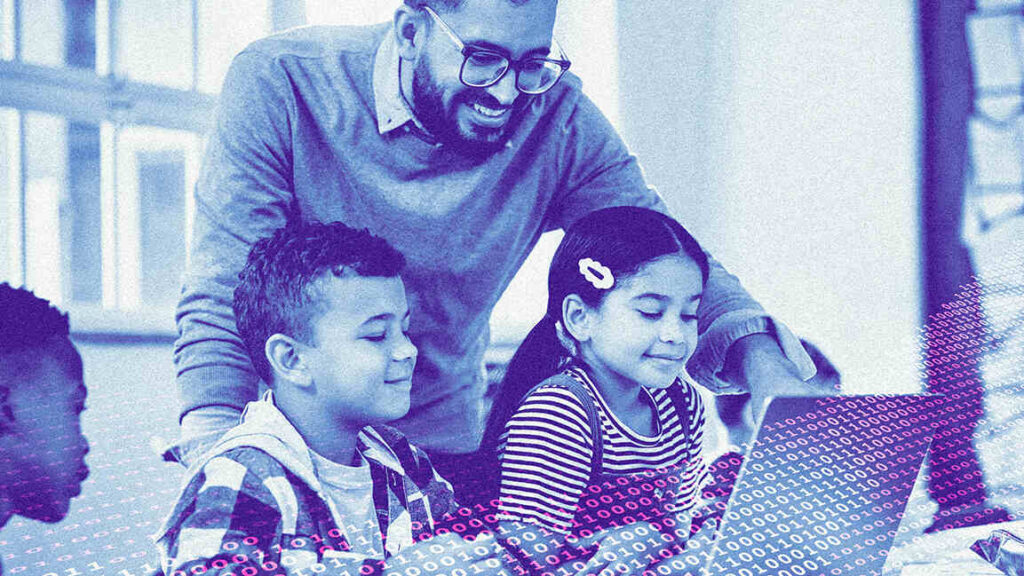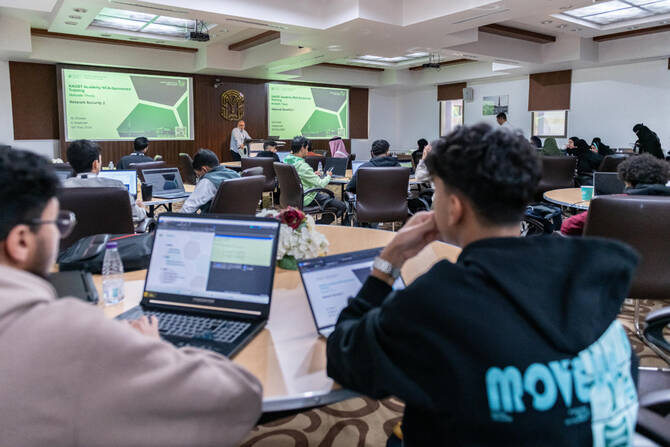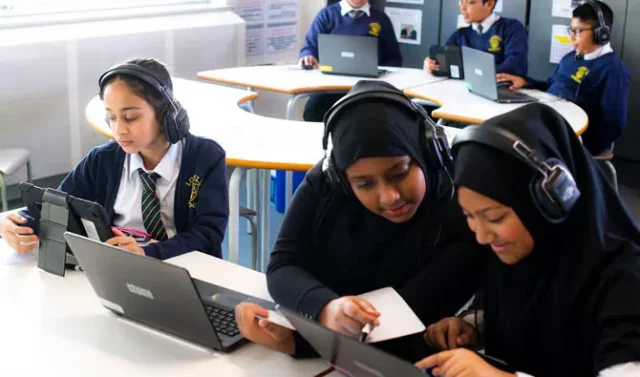In a bold educational reform aligned with its Vision 2030 strategy, Saudi Arabia will introduce a national artificial intelligence (AI) curriculum across all levels of public education beginning in the 2025–2026 academic year. The initiative marks one of the first fully integrated national AI education plans worldwide, spanning primary through secondary and into vocational training and university pathways
Table of Contents

What Is the New AI Curriculum?
Under the leadership of the National Curriculum Centre in collaboration with the Ministry of Education, the Ministry of Communications and Information Technology, and the Saudi Data & Artificial Intelligence Authority (SDAIA), the Kingdom has designed an age‑appropriate, interactive AI curriculum that progressively builds students’ understanding and application of AI concepts.
- Elementary learners will begin with foundational digital literacy, exploring AI through visuals and basic problem-solving.
- Secondary students will move into topics such as machine learning, data analytics, ethical frameworks, and programming.
- Higher education and vocational programs will deepen into advanced AI concepts, real‑world projects, and AI‑powered industries.
Crucially, AI learning outcomes will be embedded within national assessment systems, ensuring continuity and rigour across grades.
The Strategic Rationale
This policy is part of Saudi Arabia’s broader Human Capability Development Program, a flagship pillar of Vision 2030 that emphasizes economic diversification and digital expertise development.
Through this AI curriculum, the Kingdom aims to:
- Cultivate critical thinking, problem‑solving and digital literacy from early schooling.
- Create a digitally fluent generation capable of innovation and global competitiveness.
- Embed ethical awareness of AI, including privacy, bias and societal impact.
- Strengthen national leadership in AI innovation at scale, reducing reliance on foreign expertise.
“SDAIA views this curriculum as foundational — a bold step in cementing Saudi Arabia’s position among global AI education pioneers,” said officials familiar with the rollout.
Pilot Phase: High Schools Lead the Way
Earlier in 2025, Saudi Arabia launched a pilot elective course titled “Introduction to Artificial Intelligence”, offered to third‑year secondary students in the general track. Over 50,000 students participated in the initial phase, which included interactive lessons, project‑based learning, and digital platforms for delivering content.
Designed and delivered in partnership between SDAIA and the Curriculum Centre, this pilot program established the foundation for full curriculum rollout in 2025–26.
Teachers: Training and Support Systems
To ensure effective nationwide delivery, the Kingdom will launch specialised teacher training programs. Thousands of educators will be equipped with pedagogical strategies to deliver hands‑on, age‑appropriate AI learning, ensuring standardisation and quality across regions.
These initiatives connect to broader digital transformation measures already underway within the education sector, such as previous investments in e-learning platforms and coding/robotics curriculum reforms under Education Minister Yousef Al‑Benyan.
Transforming Classrooms: From Passive Learning to Active Creation
Beyond theory, the AI curriculum emphasises project-based and experiential learning. From designing simple AI solutions in middle school to tackling case studies in healthcare or energy in high school, students will apply AI in real-world contexts.
A university professor involved in curriculum design explained: “AI education enables personalised learning and performance tracking, benefitting diverse students, including those with disabilities.”
Indeed, local platforms like Alef Education and Classera already use real-time AI analytics to adapt content to student needs, with reported improvements in academic performance of up to 25 percent in one semester.

Broader Impact: A Talent Pipeline for a Digital Economy
Alignment with Vision 2030
Saudi leaders see this initiative as critical to transforming the Kingdom into a global technology hub, complementing multi‑billion-dollar investments in AI infrastructure such as Humain, the new AI company backed by the Public Investment Fund.
With tech employment rising from 150,000 in 2021 to over 380,000 in 2024, the country is accelerating its push into sectors such as cloud computing, AI model development, and digital services.
Workforce Preparedness
The Kingdom has also committed to training one million citizens in AI skills by 2025, using programmes like SAMAI and the National Skills Platform to support professional upskilling across sectors such as finance, healthcare, and retail.
Embedding AI education in schools ensures a sustainable pipeline: students grow into professionals already fluent in AI concepts and tools.
Real Voices on the Ground
A law student at King Saud University observed how emerging AI tools are already reshaping learning:
“Tools like AI tutoring systems and study apps have made learning more efficient, personalized and accessible.”
“But I must be careful—not to rely on them at the expense of critical thinking.”
A leading academic from the university further emphasised that AI supports equity and access, bridging education gaps for remote communities and students with special needs.
Challenges and Considerations
While the rollout is ambitious, transitions at this scale raise key questions:
- Curriculum Integration: How will AI content integrate with existing STEM, humanities and social studies?
- Ethical Oversight: What protections will ensure data privacy and guard against misuse of AI?
- Assessment Design: Will standardized testing account for creative, project-based AI skills?
- Teacher Capacity: Can the new training pipeline scale rapidly while maintaining standards?
- Equity Across Regions: Will rural schools and underprivileged areas gain equal access to resources and infrastructure?
Keen-eyed observers note parallels with other regions adopting national AI curricula (e.g. the UAE and China). Success depends on continuous support, feedback loops, and adaptation over time.
What Lies Ahead
With the full implementation scheduled for fall 2025, Saudi Arabia aims to complete the national rollout during the 2025–26 academic year. Its goal: to create a generation capable not only of consuming but also building AI solutions—driving productivity, innovation, and economic diversification in a post-oil era.
This curriculum forms one part of a broader transformation—including workforce upskilling, infrastructure investment, and international partnerships—to position Saudi Arabia as a global AI hub.

Conclusion
Saudi Arabia’s plan to embed AI education in schools from 2025 represents a landmark shift in national education strategy. It reflects a deep-seated ambition to nurture “future-ready” citizens equipped for a rapidly evolving digital landscape. By anchoring this curriculum within national assessments, ethics frameworks, teacher training, and hands-on learning, the Kingdom aims to cultivate both technical expertise and thoughtful, critical citizens.
As Saudi Arabia moves into the coming school year, the world will be watching: can this vision translate into a scalable model for global education in the AI era?
Summary Table
| Theme | Details |
|---|---|
| Start Date | Academic year 2025–2026 |
| Levels Covered | Primary → Secondary → Vocational → Higher ed |
| Collaborating Agencies | National Curriculum Center, Ministry of Education, MCIT, SDAIA |
| Curriculum Features | Age‑appropriate, interactive, project-based, ethics modules |
| Assessment Integration | AI learning outcomes embedded in national assessments |
| Pilot Programme | “Introduction to AI” for 50,000+ high school students |
| Teacher Training | Specialized roll‑out to equip educators with AI pedagogy |
| Workforce Connection | Linked to national human‑capital development and upskilling targets |
| SEO Focus Key Phrase | Saudi Arabia AI curriculum in schools 2025 |
By preparing students to shape tools instead of simply using them, Saudi Arabia aims to cultivate a generation of innovators, entrepreneurs, and ethical tech leaders—reflecting a truly future-oriented educational vision.
Join Our Social Media Channels:
WhatsApp: NaijaEyes
Facebook: NaijaEyes
Twitter: NaijaEyes
Instagram: NaijaEyes
TikTok: NaijaEyes
READ THE LATEST EDUCATION NEWS








































